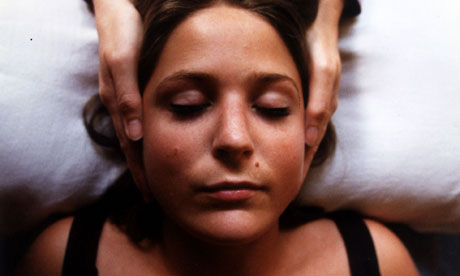American nurses recently published an intriguing study with bizarre conclusions. They recruited almost 200 patients who were receiving chemotherapy for cancer. This is, of course, a difficult time for most cancer sufferers. There may be side-effects such as hair loss, nausea, fatigue, depression etc. All of these are bound to decrease patients' wellbeing. So the nurses tested whether a session of reiki healing would improve the general wellbeing of their patients.
Reiki involves channelling "healing energy" into the body. Lots of people swear by it, but does it really work?
To find out, a proper control group is essential. The researchers therefore decided to compare reiki against "sham reiki" and against no such intervention. Sham reiki involved a non-reiki healer pretended to be a reiki healer. He was not trained in reiki and only followed the ritual of the treatment. So he did not send any "healing energy" to the patients whereas the reiki healer had been taught to do just that.
The results of this study were impressive: reiki did, in fact, make the patients fell better. Specifically, it increased the comfort and wellbeing of the patients in comparison with those who received no such intervention. Intriguingly, however, the sham reiki had exactly the same effects, and there were no differences between real and sham reiki.
What does this mean? The researchers were quite clear about their interpretation of the results. They believe reiki has been shown to work. Yet, I think the findings demonstrate exactly the opposite: genuine reiki is no better than sham reiki, thus it does not work.
Perhaps this is a rather academic matter of interpretation over which one could argue until the cows come home. However, the more pressing question is this: what should oncology teams throughout the world do about such findings?
Should they use reiki or similar therapies, as these American nurses seem to be suggesting? They clearly help desperately ill cancer patients, . Or should they avoid such treatments, because they are no better than placebo, as I and most scientists would suggest?
The scientific stance may appear heartless and cruel in light of the suffering of cancer patients, while the attitude of the nurses seems patient-centred and caring. This impression is wrong. By insisting that patients must not be treated with placebos like reiki, scientists also advocate that they receive treatments that demonstrably work better that placebo. For instance, massage has been shown to improve the wellbeing of cancer patients beyond a placebo effect. If a patient receives a massage with empathy, sympathy, time, understanding and dedication, she would benefit from the placebo effect – just like the reiki patient – but, in addition, she would also benefit from the specific effect of the treatment that massage does and Reiki does not offer.
Read more at The Guardian

No comments:
Post a Comment